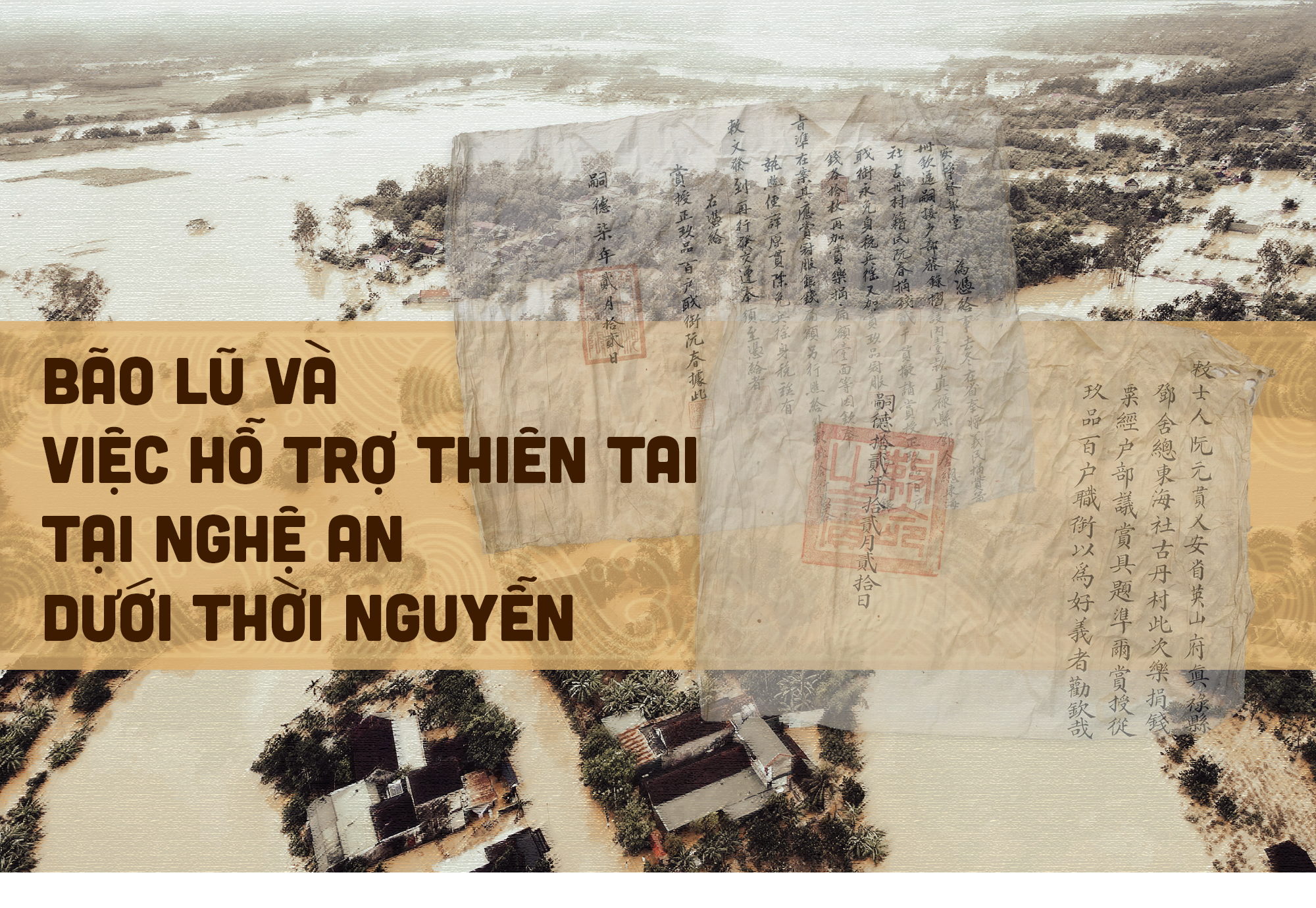

That is why, during the feudal period, the royal court built granaries to reserve and prepare for timely relief in the above-mentioned emergency situations. However, if the state granaries were not enough, the king would issue an edict or local officials would order wealthy households to pay rice to distribute to the poor. This was called 發賑 “distribution”.Complete Annals of Dai Vietsaid: “In the 8th month of the year of Nham Dan, the 5th year of Dai Tri (1362), there was a great famine. An edict was issued for the rich to donate rice to help the poor, and titles were granted according to different ranks.”

During the Nguyen Dynasty, Gia Long year 2 (1803), King Gia Long traveled to Nghe An, stopped at Ha Trung palace, and asked about the people's situation. The King saw that the people of Nghe An were hungry, so he ordered relief. He issued an edict that“This year, Nghe An town has another bad harvest, the people's faces are as green as vegetables, I am very sorry. Therefore, 35,000 square meters of rice from the warehouse will be distributed for relief, and any minister or village chief who cuts back will be sentenced to death.” Also, the collection of 5/10 of this year's special tax will be postponed.”
In the year of Quy Mui, the 4th year of Minh Mang (1823), in the autumn, the 7th month, the royal court established a rule for localities to report fires. Because before that, 681 households in 3 districts: Nghi Xuan, La Son, Chan Loc in Nghe An were burned. The Governor reported to the court and King Minh Mang ordered to give each household 2 quan of money and 1 bushel of rice.
In the year of Giap Than, the 5th year of Minh Mang (1824), the court ordered the Minister of Justice Vu Xuan Can, the Minister of Navy Ho Tien Hieu, and the Deputy Minister of Finance Nguyen Cong Dam to divide themselves to distribute food to the hungry people in Nghe An. The edict said:“Last year, Nghe An had a bad harvest, so they distributed rice from the warehouse to the people to sell, but now the price of rice is still high. I also thought that the people were poor and had no money to buy it, so there were definitely people who cried out for food along the way, going here and there to find food, so I had to find a way to help. So I ordered Xuan Can to go to the town capital and the prefectures of Ha Hoa and Dien Chau, to meet with the town god, to take rice from the warehouse to distribute, and that was until mid-March. The poor and sick who could not come to receive the rice were brought to them; the dead were given money for their funerals.”
Tham tri Vu Xuan Can returned from distributing charity in Nghe An and reported:“Nghe An people have many shameless people. Some rich people do not help anyone, but even wear torn clothes to compete with the hungry for food. On the day of the end of the distribution, each person is only given 1 quan of money and 6 bowls of rice, children are given half. I judge who is strong and healthy, I give less, children who are thin and pale, I give more.”
In the year of Binh Ngo, the 6th year of Thieu Tri (1846), Nghe An had a big storm (the storm started from the second watch and stopped by dawn). The sea level rose 13-14 meters higher than usual. 40,753 households' houses were destroyed, 696 merchant ships and fishing boats were sunk, 5,240 people were crushed to death or drowned. Especially the coastal people in Dong Thanh, Yen Thanh and Chan Loc districts were more affected (An Thanh district has a village with more than 300 people, only more than 10 people survived).
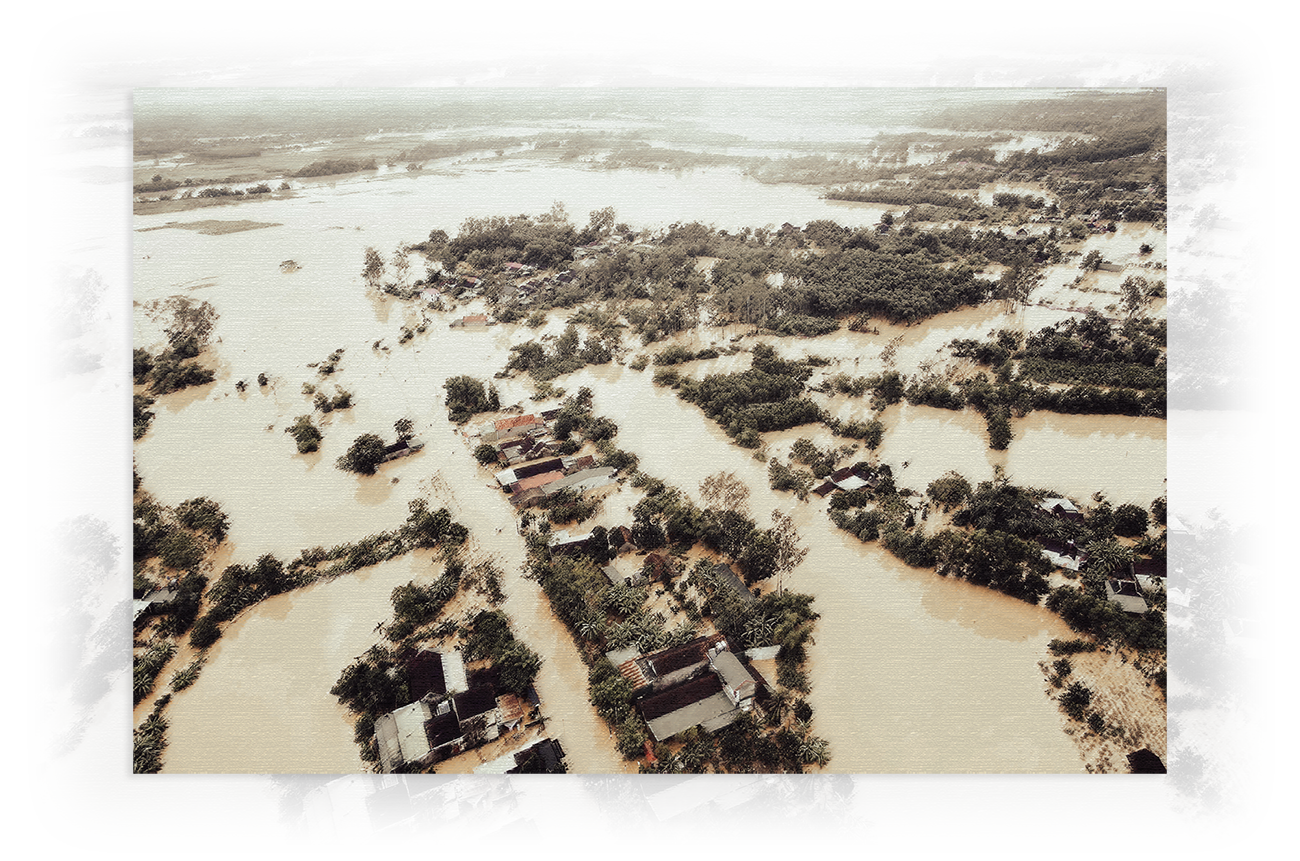
Ha Tinh was also affected: 9,160 houses were destroyed, 136 boats were sunk, 157 people died. King Thieu Tri"Immediately ordered the two provinces to examine the storm-hit areas clearly, to distinguish which areas suffered more or less damage in order to provide emergency aid."The storm in the year of Binh Ngo under King Thieu Tri caused great consequences in Thanh - Nghe - Tinh, so much so that the mandarin Vu Xuan Can had to admit to the king that:“Since I was young, I have never seen a storm as harmful as the one in Nghe An today.”
During Tu Duc's reign, famines occurred frequently, having a very negative impact on the economic and social life of the time. In 1848, the high price of rice made the people of Ha Tinh province extremely miserable. In 1852, the entire Thua Thien province suffered from drought and crop failure. In 1854, the two provinces of Son Tay and Bac Ninh were damaged by locusts. In 1856-1857, the northern provinces suffered from widespread floods, causing famine to occur everywhere the following year. In 1859, Quang Nam province suffered from famine. In 1860, Quang Binh, Quang Tri, and Binh Dinh provinces suffered from famine. In 1863, the whole country suffered from crop failure, making the famine even more severe. By 1864, even in the capital, Quang Ngai, Ha Tinh, and Nghe An also suffered from famine.
Nghe An has always been considered a place that suffers from many natural disasters and calamities, and the land is poor, so the rice in particular and the people's lives in general are not good. One year, the Nghe An provincial mandarin saw that the harvest was not good, so he requested that the amount of rice tax that had to be paid for this crop be reduced to cash. King Tu Duc thought that Nghe An was a place with bad land, and even though it had a good harvest year, it was still a bit worse than other localities, so he approved the petition...
Besides, King Tu Duc also“issuing to the classes of victims of storms, floods, fires, epidemics, tigers, and famine. If there is an unusually serious situation, it must be reported immediately (single is normal, multiple is unusual, like boating in storms and tigers is also normal). Otherwise, the exact situation must be examined, according to the rules of the distribution class. When the work of the four ministries is completed for examination, at the end of the year, the Ministry of Finance will make a general report at once.”

In the early years of Tu Duc's reign, Nghe An again suffered from natural disasters and famine, and the State treasury was not enough to provide relief. People were scattered and starved to death on the streets. At that time, a "tycoon" in Co Dan village, Dong Hai commune, Chan Loc district (now Nghi Loc) named Nguyen Xuan gave up 2,000 quan of his family's wealth to help the poor overcome their hardship. This was clearly shown in the royal decree dated December 2, the 6th year of Tu Duc:
(Because the text is still clear, we have omitted the original Chinese text)
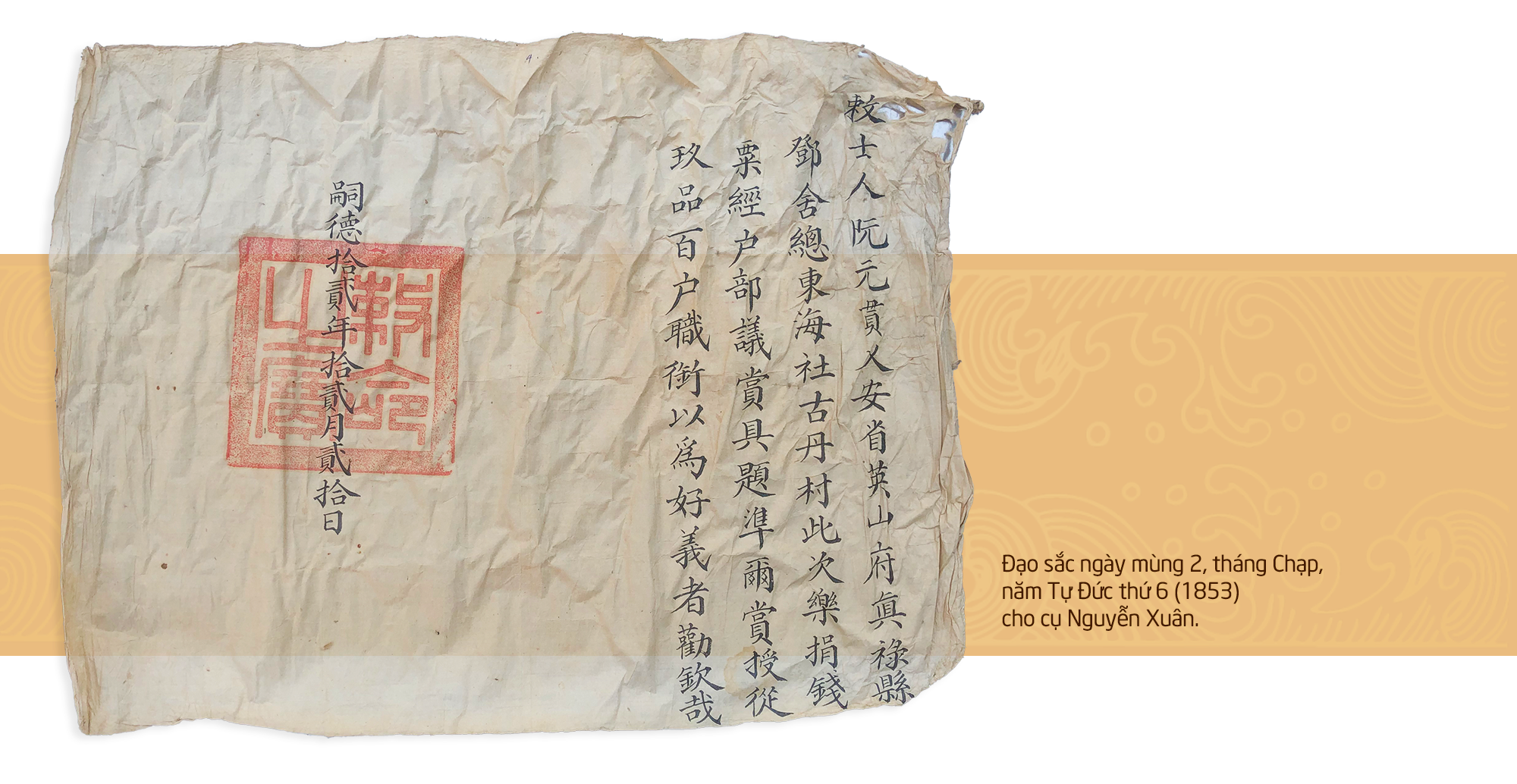
(Translation)Decree for Nguyen Xuan, a native of Co Chu village, Dong Hai commune, Dang Xa canton, Chan Loc district, Anh Son prefecture, Nghe An province, this time because of donating his fortune to help the poor, he has been rewarded by the Ministry of Finance, so that he can be appointed to the rank of Chanh 9th-rank Bach ho, to encourage filial piety. Please obey!
December 2nd, 6th year of Tu Duc (1853).
From this decree, Nghe Tinh province recorded the meritorious deeds of Mr. Nguyen Xuan in the Certificate of Merit on February 12, the 7th year of Tu Duc (1854):
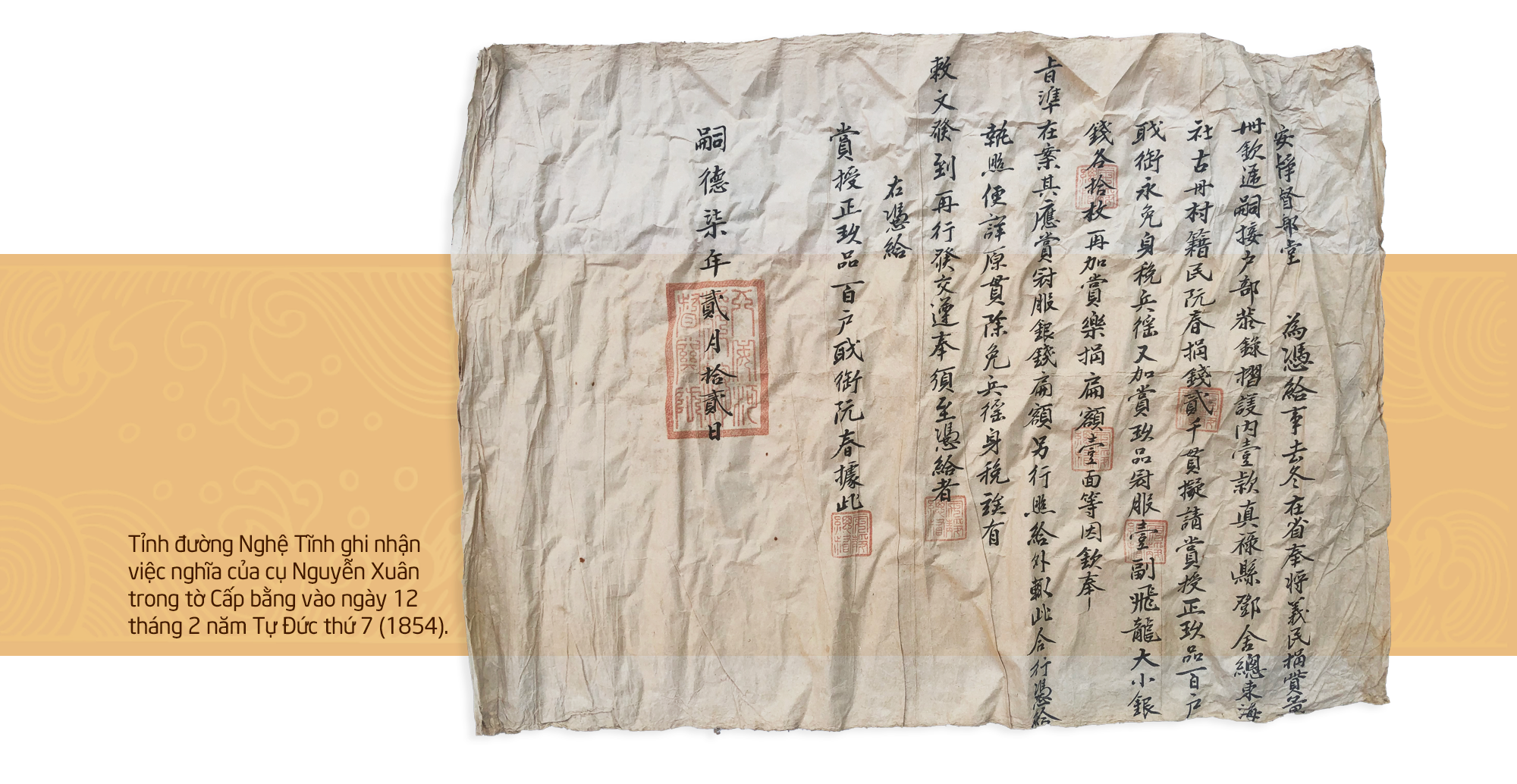
(Translation)The Governor of Nghe An and Ha Tinh. Regarding the granting of certificates: Last winter, the province respectfully submitted a list of volunteers donating money. Recently, we received a collection of documents and opinions from the Ministry of Finance, including an item about a person named Nguyen Xuan from Co Dan village, Dong Hai commune, Dang Xa canton, Chan Loc district donating 2,000 quan of money. We thought we should request to be awarded the title of Chanh 9th-rank Bach Ho, forever exempt from personal tax and military service, and also awarded a set of 9th-rank official uniform, large and small flying dragon silver coins worth 10 dong each, and also awarded a plate.Donation list. Respectfully obey and comply with that document, approve the award of official uniforms, money and badges, in addition to carrying out the examination and granting, immediately carry out the issuance of certificates to validate the decree, facilitate the thorough examination of the place of origin, in addition to exemption from military service and personal tax, wait for the decree to arrive and then carry out the delivery, please respectfully comply. The above certificates must be delivered to the recipient.
Above is the degree.
The award of the title of Chief Ninth Rank Hundred Mansion Nguyen Xuan, please work accordingly.
February 12, 7th year of Tu Duc (1854).
The “Donation” plaque mentioned in the above-mentioned certificate is still hanging in the most solemn position in the Nguyen Co Dan family temple. Through the ups and downs of time, along with the ups and downs of the era, the plaque still has its original writing, proving the kind heart of Mr. Nguyen Xuan towards the people of Nghe An at that time. The plaque has the following words:
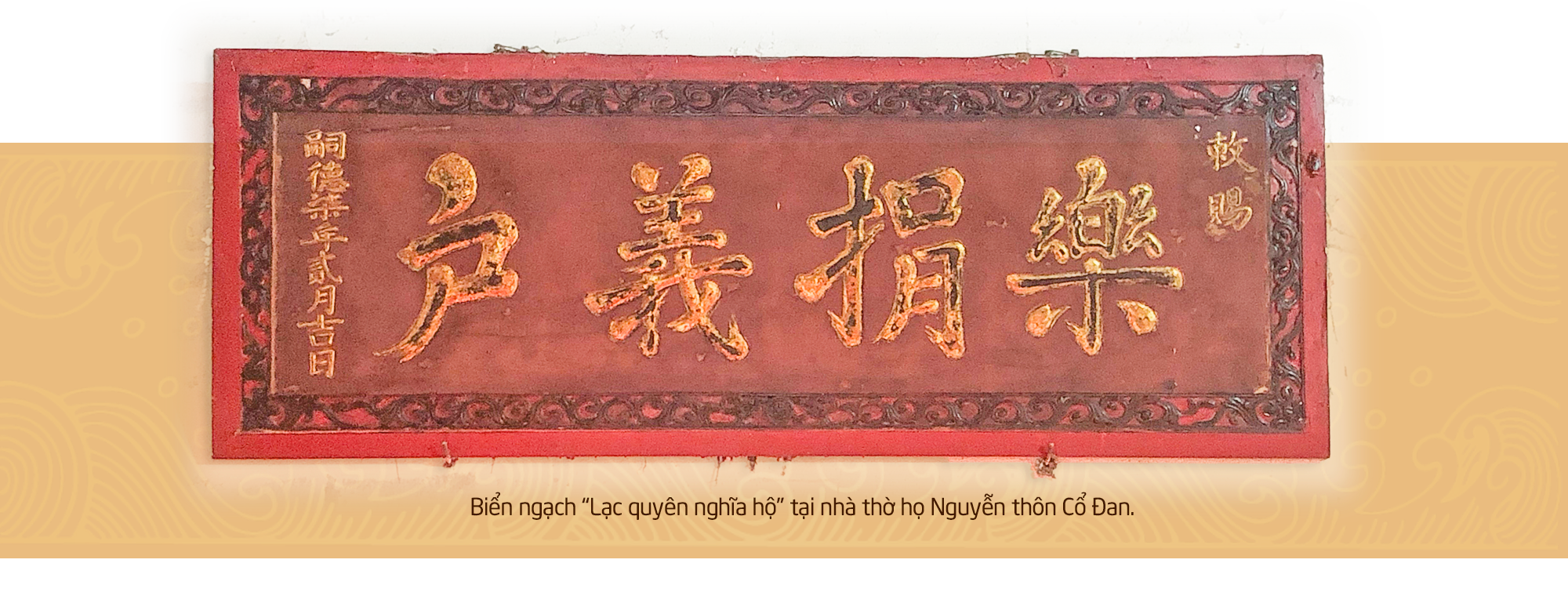
Original:
敕賜
樂捐義戶
嗣德柒年二月吉日
Transcription:
Four colors:
Donations to the Charity.
Auspicious day, February 2, 7th year of Tu Duc.
Translation:
The King grants (the Decree) to:
The family (HO) doing charity work (NGHIA) is voluntarily (LAC) donating (QUYEN) to the people.
The sign was issued on a good day in February, the 7th year of Tu Duc (1854).
Based on the 7th year of Tu Duc, we know that this edict was created in 1854, exactly 170 years ago.
Returning to the content of the above plaque, we can confirm that the content of the royal decree is about charitable activities, in which the main information stands out:
First are the two words 敕賜 “Sắc tư” which is a shortened form of “Quân chủ cáo mệnh thưởng tư” 君主誥命賞賜 (the monarch issues a decree to reward) which means objects, items (physical) or titles, graces (intangible)… are awarded by the monarch (king) to a person or a certain establishment or organization. In which, the word 敕 is an edict, a decree of the king, exclusively belonging to the king, and only the king can use this word. The places and organizations that were granted “sắc tư” 敕賜 were granted a gift by the Nguyen Dynasty.
Besides, the charitable activities under King Tu Duc were organized activities and had the participation of many social classes, which could be individuals, could be families... like the case of the above mentioned quota (family) of Mr. Nguyen Xuan and with the donation of 2,000 quan of money to relieve hunger for local people. There is no evidence that the Nguyen Dynasty"issued an edict for the rich to offer rice to the poor, and granted titles according to different ranks"like the late Tran Dynasty, but clearly the charitable activities under the Nguyen Dynasty were classified as "Nghia", because this was an act of serving the community's interests in a spirit of (happy) voluntary. With this act of charity, Mr. Nguyen Xuan, in addition to the spiritual honor of being granted the "Lac Quyen" quota, was also recognized by the royal court."rewarded with the title of Chanh 9th-rank Bach Ho, forever exempt from personal tax and military service, and awarded with a set of 9th-rank official uniform, large and small silver dragon coins worth 10 coins each."
During feudal times, on the social level, when an organization or individual was awarded a “sac tu” on the rank plate, it proved that the organization was honored to be cared for by the king. Attaching the two words “sac tu” + [compliment content] was to make it more luxurious and noble in terms of reputation and title. Therefore, the rank plate with the word “Sac tu” affirmed the noble position of that organization. This is truly a very noble and proud reward, not only for the individual but also the common pride of the family, clan, and hometown of the person receiving the reward.
Mr. Nguyen Dau Thao - a descendant of the Nguyen Co Dan family also added:“The elders in the family all tell the story of the day when the whole family and the homeland of Co Dan received the Lac Quyen plaque. That day, the whole family and the village were happy and welcomed it solemnly. The family chose the most solemn place in the house to hang it. And when the person who was awarded the plaque passed away, the descendants respectfully hung it in front of the altar, becoming a family heirloom. This is also a beautiful symbol for future generations to remember and preserve the family's tradition.”That is why 5 years later, Mr. Nguyen Nguyen in the family continued the charity work, donating money to charity. This was clearly shown in the Decree dated March 20, the 12th year of Tu Duc:
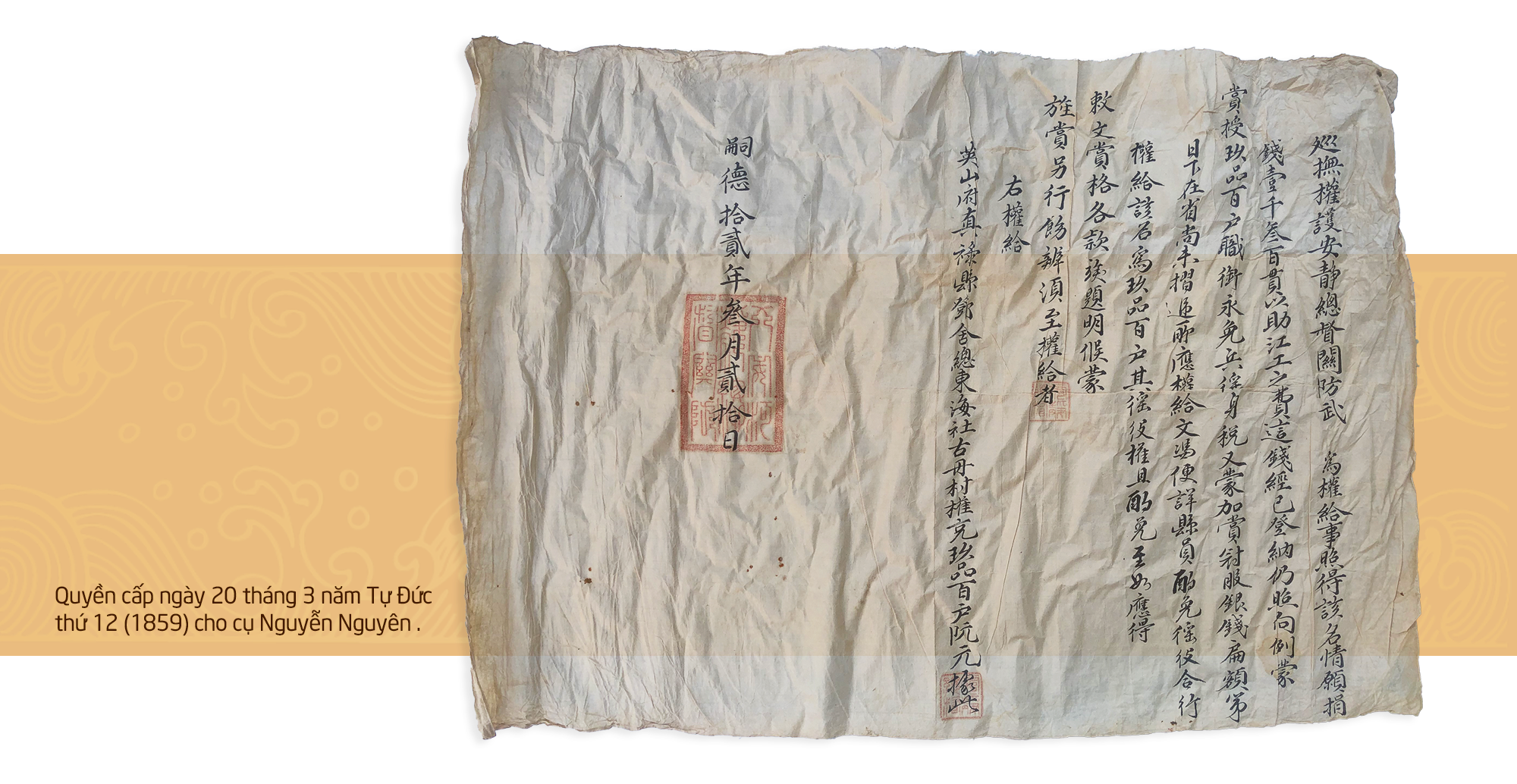
(Translation)The Governor, temporarily holding the position of assistant to the Governor of An Tinh [surname] Vu. Regarding the granting of certificates:
Considering that person voluntarily donated 1,300 quan to help with the work of the river diggers. But according to previous regulations, he was gratefully rewarded with the rank of Ninth-rank Hundred-man, forever exempted from military service and personal tax, and was also awarded various official uniforms, money, and a license plate. Later, the province had not yet made a report to transfer the transfer, so it was thought that a temporary certificate should be issued, and the district official should be informed to waive the transaction, and immediately carry out the temporary issuance of the certificate to that person as Ninth-rank Hundred-man, the transaction should be temporarily waived, until the approval of the decree granting the award, the items should be clearly stated for the award, and in addition, the work of the work should be carried out immediately. The above certificate must reach the hand of the person to whom it was issued.
The above certificate is issued to:
The right to appoint the 9th-rank Hundred-man Nguyen Nguyen in Co Dan village, Dong Hai commune, Dang Xa canton, Chan Loc district, Anh Son prefecture, please base on that.
March 20, 12th year of Tu Duc (1859).
[Seal] Nghe An Ha Tinh Governor General.
During the Nguyen Dynasty, our country was still basically an agricultural country, and often suffered from natural disasters and floods, so the issue of water management was even more important. Moreover, because the large rivers did not have a water regulation mechanism, water management and irrigation were the top priorities. Compared to previous feudal dynasties, the Nguyen Dynasty carried out irrigation work on a larger and more systematic scale. The digging of rivers aimed to balance and regulate water sources from places with excess to places with shortage, so that water could be beneficial and not cause harm; contributing to ensuring water resources and ensuring water security in all situations. Therefore, building dikes or digging rivers was an extremely necessary task.
In addition to donating money and rice to the people, the Nguyen Co Dan family also paid for workers to dig rivers to build irrigation systems. On December 20, the 12th year of Tu Duc (1859), Nguyen Nguyen was again recognized by the royal court for his charitable work to encourage acts of kindness:
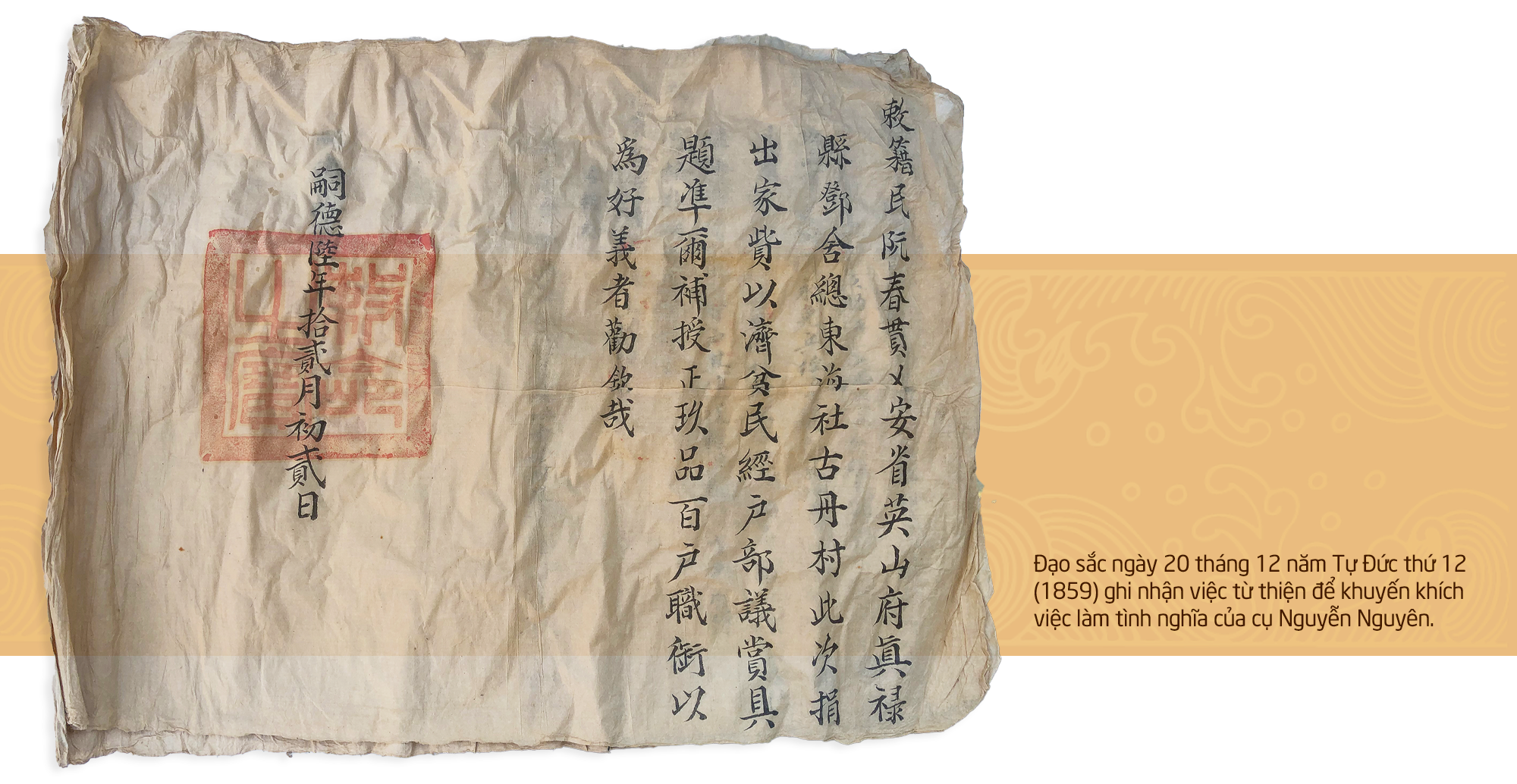
(Translation)Decree for Scholar Nguyen Nguyen, native of Co Chu village, Dong Hai commune, Dang Xa canton, Chan Loc district, Anh Son prefecture, Nghe An province, because this time he collected money and rice, the Ministry of Finance has discussed and requested for rewards, so that you are granted the title of Tong 9th-rank Bach Ho, to encourage people of filial piety. Please obey!
December 20, 12th year of Tu Duc (1859).
Vietnam is a country that suffers from many natural disasters, especially storms and floods. Prolonged storms have caused widespread flooding in many localities, with floodwaters rising in many places, isolating areas; causing serious damage to facilities and infrastructure, loss of life and property, and negatively affecting people's lives; having a profound impact and causing losses and damage to the entire region; especially destroying, delaying and negatively affecting the country's socio-economic development. Therefore, under feudal dynasties, there were many rescue and relief policies and many social sectors responded to them to raise donations and provide relief, of which the "Local donations for charity" signboard of the Nguyen Co Dan family is a typical example. "That"In times of trouble we understand each other"So for generations, our people have had a tradition imbued with humanity, not only expressed through words like"Donation for the righteous family", "Donation for the righteous father", "Donation for the righteous family"…but also expressed through many folk songs and proverbs such as:“Love others as you love yourself”; “The whole leaves cover the torn leaves”; “The torn and the healthy cover each other, the bad and the strong help each other”;good “A piece when hungry is worth a pack when full.”; “Gourd, please love the squash too/Although we are different species, we share the same trellis”; “When you see someone hungry and ragged, you should feel sorry for them/When they are cold, you should clothe them, when they are hungry, you should feed them”…
